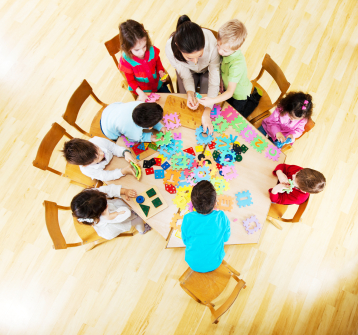Educational Practices for All Learners in Early Childhood Settings
 Providing access for children with disabilities to participate in a wide range of learn¬ing opportunities and settings is a defining feature of inclusive early childhood education. Preschoolers with disabilities can receive their Extended IFSP and IEP services in community early childhood settings with their peers, with simple modifications and supports that benefit all children.
Providing access for children with disabilities to participate in a wide range of learn¬ing opportunities and settings is a defining feature of inclusive early childhood education. Preschoolers with disabilities can receive their Extended IFSP and IEP services in community early childhood settings with their peers, with simple modifications and supports that benefit all children.
For example:
- Flexible structure and consistent routines e.g., keep young children interested and meaningfully occupied in learning tasks with their peers.
- Developmentally appropriate practice e.g., intersperses sitting time with movement and singing to facilitate young children’s attention span.
- Instruction and support in developing interpersonal skills e.g., initiating interactions, making friends, and communicating emotions prepare children to successfully negotiate social situations.
- Consistent positive feedback from teachers e.g., prompts and reinforcement encourage children to behave in desirable ways.
Application of the following practices and frameworks helps ensure that every young child has access to learning environments that incorporate evidence based practices in the curriculum throughout daily routines and activities.
Developmentally appropriate practice
- Keys to embedding DAP
- Universal design of learning
- Universally designed toys
Promoting the social/emotional development of all children
- Create a supportive social environment for forming friendships
- Facilitate opportunities for interactions with peers
- Prompt children to engage in positive social interaction

